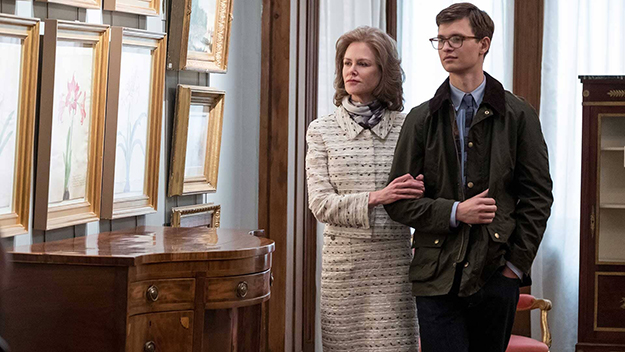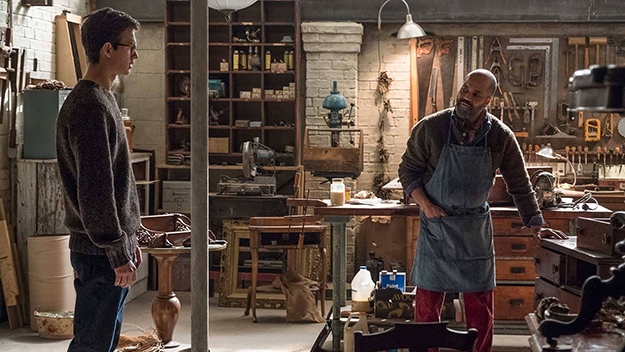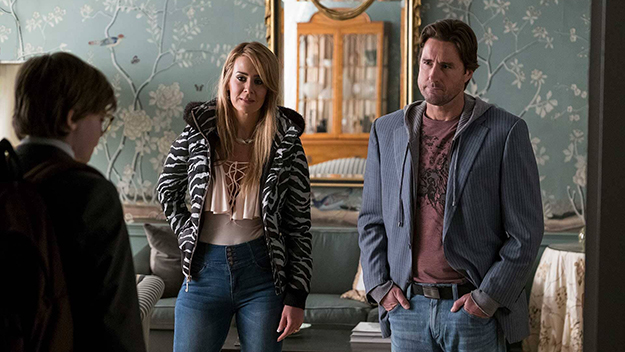Deep Focus: The Goldfinch

The Goldfinch (John Crowley, 2019)
The grace and ebullience that powered Ansel Elgort through Baby Driver have nowhere to go in the lead role of high-powered New York antique-furniture salesman Theo Decker in The Goldfinch. This self-made connoisseur, skilled at passing off quality reproductions as genuine articles, can act agreeably glib in an opaque, mysterious way. (He commits fraud to cover the taxes and increase the business of a first-class restoration worker who took Theo under his wing when he was orphaned.) Most of the time, Elgort simply looks distraught and confused—though not as befuddled as the audience gets.
Coming off the beautiful, relatively small-scale Brooklyn, director John Crowley, a sometime master of ensemble pieces (Intermission, Closed Circuit), must have viewed this adaptation of Donna Tartt’s mammoth bestseller and Pulitzer Prize-winner as a chance to flex his directorial muscle. Tartt’s engrossing saga roams from New York to Las Vegas and Amsterdam, spans a decade and a half, and encompasses fine art, high crime, and the twisting fates of several families wounded by sudden deaths, including that of Theo’s mother.
The plot revolves around “the butterfly effect”—multiple consequences arising from small actions—and it should move with a combination of robust grace and lyrical flutter. Sadly, this film is flapping broken wings. Peter Straughan’s script renders the story in a jagged mosaic style that Crowley can’t sustain for 149 labored minutes. Tartt’s 771 pages get reduced to bite-sized pieces, except there isn’t much bite to them. Glints of style and insight from individual actors like Nicole Kidman illuminate a patch or two. The uncanny intensity of cinematographer Roger Deakins’s imagery holds isolated sections together, as his camera takes in a bleak Las Vegas suburb, or the deep blue night of the hero’s lonely Christmas in Denmark. (The book makes intelligent references to several classic movies, including It’s a Wonderful Life and Citizen Kane.)
But none of it compensates for a script that takes forever to unfold the premise as it flashes between Elgort’s adult and Oakes Fegley’s adolescent Theo. In 2004, Audrey Decker (Hailey Wist) and her 13-year-old son seek refuge from a downpour in the Metropolitan Museum of Art, on a day when terrorists detonate two bombs inside. Separated from his mother at the time of the blasts, Theo survives. (He soon learns she doesn’t.) Amid a grey-white sea of refuse, smoke, and ash, and charred, scarred flesh and bones, Theo has a mystical encounter with a dying man, Welty (Robert Joy), the half-uncle of a red-headed girl named Pippa (Aimee Laurence), who caught his eye before the havoc. At Welty’s enigmatic direction, Theo grabs Carel Fabritius’s The Goldfinch—a masterpiece of Dutch Golden Age painting—from the wreckage, then stows it in an anonymous bag, as he struggles into a street clogged with victims and first responders.

Theo’s secret treasure becomes his existential anchor and moral burden as he endures a lifelong guilt trip over his mother’s death. After all, he reasons, if he hadn’t been suspended for supposedly smoking in the schoolyard, he and his mom would not have been on their way to meet the principal when the rains came, and the bombs. But this butterfly effect also results in a young man breaking out of his cocoon. His unthinking acquisition of The Goldfinch, and his inability to return it, lead him into limbos where ethics give way to animal survival—and the preservation of aesthetic beauty generates its own moral imperatives.
Desperate to avoid an orphanage or foster care (his father abandoned him and his mother months before), Theo asks social workers to bring him to the plush Park Avenue digs of the Barbours (headed by Kidman and Boyd Gaines), the home of Andy (Ryan Foust), his best elementary school friend and their most unlikely, intellectual child. As Andy, Foust earns the film’s biggest laughs with his unflappable deadpan, offbeat timing, and geeky honesty. One of the few guffaws in the movie comes when Andy sweetly-snidely asks Theo whether he’s losing weight “to fit into your prom dress.” Soon Theo’s emerging memories of Welty guide him to the Greenwich Village antique shop he had operated with restoration expert and wise, old-fashioned artisan Hobey (Jeffrey Wright). That’s where Theo finds the recuperating Pippa and bonds with her until her half-aunt takes her to Texas. He also falls in love with Hobey’s craft.
Just when Theo gets psyched to experience the Yankee charms of a Maine summer vacation, his father (Luke Wilson) reappears to shatter his newfound stability and whisk him to Las Vegas with his brassy mistress Xandra (Sarah Paulson). There a Russian-born rapscallion named Boris (Finn Wolfhard) introduces Theo to Ecstasy, opioids, and acid and initiates a new line of action that crisscrosses the world and resolves the fate of Fabritius’s Goldfinch. The script ultimately compresses pages of Boris’s jazzy verbal peregrinations about good and evil (“Where does it ever say, anywhere, that only bad can come from bad actions? Maybe sometimes—the wrong way is the right way?”) and theology (“Understand, by saying ‘God,’ I am merely using ‘God’ as reference to long-term pattern we can’t decipher. Huge, slow-moving weather system rolling in on us from afar”) into a speech wide-ranging and philosophical enough to cover everything in the movie and satisfy seekers of life lessons.

Viewers may not get even that much from the film unless they pay strict attention. Crowley and Straughan must have judged that staging the act of terrorism all-out, near the beginning, would overpower the rest of the film. Instead they insert spectral flashbacks to the ash-caked museum that grow repetitive and even annoying, like an intellectual tease. By the time they reveal the mysteries of Theo’s behavior during and after the horrific episode, our curiosity is sapped. We feel that two-thirds of the movie must be stuck in the filmmakers’ heads. Theo’s mother, with her tender vivacity, energizes the opening chapters of the book. But Crowley and Straughan don’t let us see or hear her until the denouement. They must believe that her absence from the movie will convey how empty Theo feels without her. It’s an absurdly bad call: how can we miss a person we don’t know or even see? Her late-inning appearances are less cathartic than frustrating: we immediately see in retrospect how badly this movie needed her early on. As in his inexplicably acclaimed adaptation of John le Carré’s Tinker Tailor Soldier Spy, screenwriter Peter Straughan writes less of a dramatic adaptation than a cerebral cinematic gloss for people who know the source material well enough to fill in what he leaves out.
Crowley is usually so gifted with actors that he might have felt he could draw out from the cast all the crucial emotional and intellectual texts that Straughan thinks he’s turning into subtext. Caught in the pointless pointillism of flashcard scenes and abrupt time jumps, few performers here have the chance to sustain a flow of emotion or invention. Young Fegley, who had quick and piercing eyes in David Lowery’s magical Pete’s Dragon remake, spends a lot of time squinting behind spectacles as 13-year-old Theo. He’s an affecting performer, but it would take a prodigy to navigate Theo’s swings from detesting his father to being mildly amused by him. Kidman superbly creates a self-contained and almost self-stylized woman who feels unexpectedly drawn to Theo’s aesthetics and good nature (she’s caught gazing at him too adoringly when he’s 27). The actors who play the twentysomething versions of Pippa (Ashleigh Cummings) and the Barbours’ daughter, Kitsey (Willa Fitzgerald), are snagged in parts that the script’s compression makes unplayable. Pippa and Theo love each other, but, she says, it would be a disastrous match because they’re too much alike. We know this because she blames herself for Welty’s death just as Theo blames himself for his mother’s. Meanwhile, uptown, Theo and Kitsey get engaged, though Kitsey never stops having an affair with the loathsome former classmate who let Theo take the fall for the cigarette incident in the first place. When Kitsey states that they’re still a good match even though they don’t love each other, it registers as an awkward homage to the vacuous blonde in Annie Hall who admits she can be happy because “Uh, I’m very shallow and empty and I have no ideas and nothing interesting to say.”
None of this would matter if Crowley and Straughan had made the central character and plot commanding and fully comprehensible, or if they had imbued their intricate patterns of loss and regret with force and gravity, or generated the storytelling momentum that would make us feel the catharsis of letting go after the intransigence of sorrow. Unfortunately, in The Goldfinch, a barrelful of cinematic filigree adorns an empty antique memory box.
Michael Sragow is a contributing editor to Film Comment and writes its Deep Focus column. He is a member of the National Society of Film Critics and the Los Angeles Film Critics Association.







